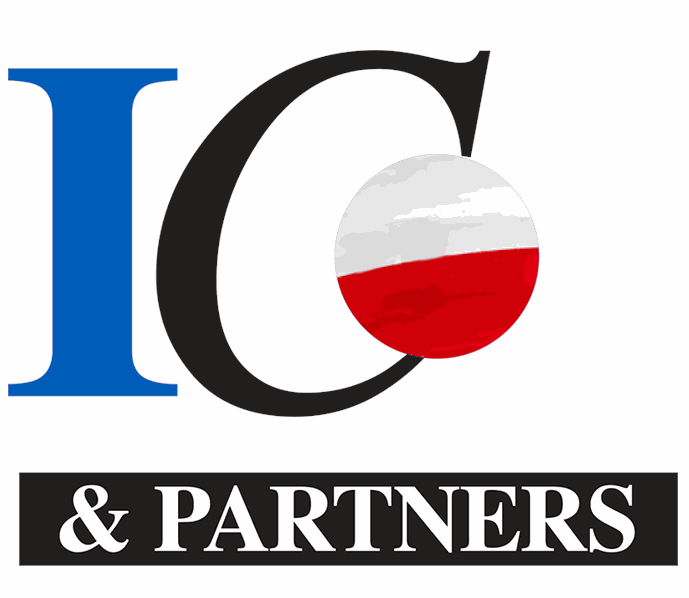Newsletter IC&PARTNERS POLAND – 2023-02
info@icpartnerspoland.pl

Amendment of the Labor Code
The Sejm passed the largest amendment to the Labor Code in years. The introduction of changes was enforced by EU law, but some of the rights, such as extending parental leave, were decided by the government. The new legislation has now gone to the Senate. They are to enter into force - in most cases - 21 days after the announcement. Below are the most important changes:
1. Extended parental leave
The new regulations provide for the extension of parental leave by an additional two months. Its duration will formally increase from the current 32 weeks to 41 weeks. In practice, this extra time will be dedicated to fathers, i.e. it will be lost if they do not use it (days off will not be transferred to the mother). These two additional months will be paid in the amount of 70%. Importantly, the father's right to take leave will not depend on whether the child's mother has it (i.e. whether she is an employee or runs her own business and pays sickness insurance).
2. Nadgodziny i delegacja za zgodą
Pracownika wychowującego dziecko do 8. roku życia nie będzie można bez jego zgody:
- employ overtime or at night,
- include an intermittent working time system (with a maximum 5-hour break during the day)
- delegate outside the permanent place of work.
3. Care leave
The draft provides for the introduction of a 5-day care leave. It will be provided to provide personal care or support to a family member (parents, children or spouse) or to someone who lives with the employee.
4. Exemption from work due to force majeureKolejne dodatkowe dwa dni wolnego będzie można zyskać, korzystając ze zwolnienia z pracy z powodu działania siły wyższej w pilnych sprawach rodzinnych spowodowanych chorobą lub wypadkiem, jeżeli niezbędna jest natychmiastowa obecność pracownika, czyli np. w razie powodzi lub innych klęsk żywiołowych albo katastrof, a także w przypadku uszkodzenia domu, wypadku dziecka w szkole, nagłej choroby członka rodziny itp. Czas zwolnienia – w przeciwieństwie do urlopu opiekuńczego – będzie płatny, ale w wysokości połowy przysługującego wynagrodzenia. Omawiane wolne będzie można wykorzystać w dniach (dwa dni rocznie) lub w godzinach (16 godzin).
5. Longer break at work, up to 30 minutesPo zmianach pracownicy pracujący więcej niż 9 godzin dziennie zyskają drugi wolny kwadrans. Jeśli zaś ich dniówka przekracza 16 godzin, to będą mieć prawo do trzech 15-minutowych przerw.
6. It will be more difficult to dismiss people on fixed-term employment contractsNowe przepisy zakładają, że pracodawca będzie musiał uzasadniać wypowiedzenie umowy na czas określony i konsultować je z reprezentującym pracownika związkiem zawodowym. Obecnie takie wymogi dotyczą tylko wymówienia umowy na czas nieokreślony.Jeśli wspomniane osoby odwołają się od zwolnienia do sądu (co będzie prostsze, bo można kwestionować przyczynę wskazaną przez pracodawcę), to będą mogły domagać się przywrócenia do pracy, a nie jedynie odszkodowania.
7. New rules for applying contracts for a trial periodMaksymalny czas trwania umowy próbnej będzie zależał od długości umowy na czas określony, jaką firma będzie chciała zawrzeć z zatrudnionym po okresie próby.
Contracts for a trial period may be concluded for a period not exceeding:
• one month - in the case of the intention to conclude an employment contract for a definite period of less than six months,
• two months - in the case of the intention to conclude an employment contract for a definite period of at least six months and less than 12 months,
• three months - in other cases (eg when, after the trial period, the company immediately wants to conclude a contract for an indefinite period).
Dwa pierwsze z wymienionych terminów będzie można dodatkowo wydłużyć o maksymalnie jeden miesiąc. Ponowne zawarcie umowy na okres próbny z tym samym pracownikiem będzie dopuszczalne, jeżeli ma być on zatrudniony w celu wykonywania innego rodzaju pracy.
8. New information and training obligations
The amendment to the Labor Code also provides for many minor, detailed changes that are to facilitate the employees' access to reliable information on employment conditions. In addition, the company should inform about the rules for changing from one shift to another (if the company uses shift work) and the employee's right to training, if the employer provides it, in particular about the general principles of the employer's training policy. What is important, if the company has to conduct given trainings at a specific workplace (because, for example, it results from the law or a collective labor agreement), they are to be held at the expense of the employer and, if possible, during the employee's working hours. The time of training outside of the working day will be included in the working time.
9. Improved employment conditionsRaz w roku pracownik będzie mógł wnioskować do firmy np. o umowę na czas nieokreślony lub o cały etat (jeśli jest zatrudniony odpowiednio na czas określony lub na część etatu). Pracodawca ma — w miarę możliwości — uwzględniać taki wniosek zatrudnionego. Jeśli odmówi, to będzie musiał wskazać przyczynę swojej decyzji.
10. Parents of young children with better protection from dismissalNowe przepisy jednoznacznie przewidują, że pracownicy będą chronieni przed zwolnieniem nie tylko np. w okresie urlopu macierzyńskiego lub rodzicielskiego, ale już od momentu złożenia wniosku o takie wolne na opiekę nad dzieckiem.
Przepisy będą też chronić osoby domagające się transparentnych warunków zatrudnienia. Jednoznacznie wskażą, że przyczyną wypowiedzenia umowy nie może być:
• requesting information about employment conditions (e.g. about trainings),
• applying for a change in the type of contract or working hours,
• simultaneous, parallel employment in another company (of course, it will still be possible to conclude non-competition agreements).
Slim VAT 3
On January 24th, 2023, the government adopted another package of solutions aimed at facilitating the settlement of tax on goods and services, the so-called SlimVAT 3.
Projekt przewiduje m.in.:
• increasing the sale value limit for a small taxpayer from EUR 1.2 million to EUR 2 million, which will enable more taxpayers to use the cash accounting method and quarterly VAT settlements.
• resignation from the requirement to have an invoice regarding the WNT when deducting VAT on this account. Therefore, the invoice will not be a formal condition for deducting VAT. As a consequence, the input and output tax on the WNT will always be settled in the same settlement period;
• the possibility of submitting corrections to declarations outside the OSS and IOSS systems directly to the Łódź Tax Office.
• clarification of one general rule regarding the conversion of the foreign currency exchange rate in correcting invoices in plus and minus: basically, the exchange rate used to convert the amount of the correction of the tax base on the correcting invoice is to be the same exchange rate that was adopted for the original settlement.
• As part of the savings in the public finance system, resignation from the obligatory issuance by the tax authorities of decisions on crediting the payment/overpayment/tax refund against tax arrears and late payment interest.
Ministerstwo Finansów planuje, że pakiet SLIM VAT3 wejdzie w życie 1 kwietnia 2023 r.
Tymczasem w wypowiedzi prasowej Ministerstwo Finansów zapowiedziało już kolejny pakiet Slim VAT 4. Szczegóły nie są jeszcze znane. Wiadomo, że prace nad nowym pakietem miałyby się rozpocząć w 2024 r.
Major tax changes in 2023
• From January 2023, taxation of revenues from private rental will be possible only in the form of a lump sum (they will no longer be taxed on general terms, according to the tax scale);
• Taxpayers who rent residential premises as part of business activity will not be able to depreciate these premises from 2023 and include depreciation write-offs as tax deductible costs;
• In 2023, the PIT tax scale introduced in 2022 will apply: the tax rate in the first tax bracket will be 12% up to PLN 120,000. PLN and 32% on the surplus over PLN 120,000. zloty. The tax-free amount will be 30,000. zloty;
• From 2023, taxpayers (employees, principals, persons employed under a contract for specific work) will submit all statements and applications to payers (employers) in the manner adopted by a given payer. This means that these documents can be submitted in paper, electronic form or, for example, through the payer's (employer's) HR and payroll system;
• Entry into force of changes in cash payment limits has been postponed. From 2023, it was planned to introduce a new (lower) limit for cash payments in transactions between entrepreneurs (reduction from PLN 15,000 to PLN 8,000) and to introduce a new limit for cash payments made by natural persons not conducting business activity (consumers) to entrepreneurs (20 thousand PLN). However, the entry into force of the new limits has been postponed for a year and they are to apply only from January 1st, 2024;
• In 2023, there were also many previously announced changes in CIT, including:
- The provisions on hidden dividends have been repealed.
- The minimum tax has been suspended until the end of 2023 and its structure will change.
- The provisions on Estonian CIT have been clarified.
- The changes will also affect issues related to transfer pricing:
repealing the regulations on indirect haven transactions;
raising the documentation thresholds for direct paradise transactions to PLN 2.5 million for financial transactions and PLN 500,000 for non-financial transactions;
Change of the deadline for
preparing local transfer pricing documentation: by the end of the 10th
month after the end of the tax year and submission of the TPR-C declaration by
the end of the 11th month after the end of the tax year.

IC&Partners Poland S.A.
Plac Powstańców Warszawy 2a
00-030 Warszawa
Tel: +48 22 828 39 49
Fax: +48 22 827 78 91
info@icpartnerspoland.pl
#Newsletter #Poland #Polonia #Polska #Law #Tax #Accounting #Payroll
#Internazionalizzazione #IC #International #Consulting
#ICPartners #ICPartnersPoland
#SupportingBusinessWorldwide

